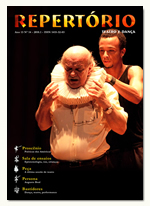<b>Epistemologias não-cartesianas na interface artes-humanidades</b> <br>[Denise Coutinho, Eleonora C. da Motta Santos]
DOI:
https://doi.org/10.9771/r.v0i14.4666Resumo
O objetivo deste artigo é apresentar resultados de três anos de trabalho sobre o desenvolvimento de modelos epistemo-metodológicos não-cartesianos para pesquisas em artes e humanidades na universidade. Uma questão norteou esta investigação: A pesquisa acadêmica necessitaria ter como referenciais modos consagrados pela cientificidade para apresentar- se rigorosa em seus objetos, métodos, questões, objetivos e finalidades? Nosso trajeto busca apontar, na história do pensamento ocidental, as bases para o que viria a vingar, no século 17, como modelo da constituição das ciências modernas com a cisão artes x ciências, não existente até então. Em seguida, apresentamos alguns pensadores que, entre o final do século 19 e todo o século 20, produziram importantes quebras no edifício cartesiano, com destaque para Sigmund Freud e alguns conceitos psicanalíticos. Por fim, apostamos que a presença da cultura artística na universidade é tão irreversível quanto a presença, já bastante estabelecida, das ciências, das humanidades, da tecnologia. A singularidade do fazer artístico, refletida em seus processos e objetos, impõe estudos e desenvolvimento de métodos coerentes com tais investigações.The aim of this paper is to present the result of over three years working on the development of models epistemo-methodological non-Cartesian for research in the arts and humanities in the university environment. One question guided this endeavor: should academic research have as reference methods laid down by science in order to be rigorous regarding objects, methods, issues, goals and purposes? Our path search point to the history of Western thought, the basis for what came to succeed in the 17th century as a model of the constitution of modern sciences, with the arts versus sciences divide, which did not exist until then. Next, we introduce some thinkers that since late 19th century and throughout the 20th century produced major breaks in the Cartesian building, especially Sigmund Freud and some of psychoanalytical concepts. Finally, we bet that the presence of the arts at the University is as irreversible as the presence, already well established, of sciences, humanities and technology. The uniqueness of artistic making, reflected in its processes and objects, requires study and development of methods consistent with such investigations.
Downloads
Não há dados estatísticos.
Downloads
Publicado
2010-11-03
Como Citar
Repertório, T. & D. (2010). <b>Epistemologias não-cartesianas na interface artes-humanidades</b> <br>[Denise Coutinho, Eleonora C. da Motta Santos]. Repertório, (14), 65–73. https://doi.org/10.9771/r.v0i14.4666
Edição
Seção
SALA DE ENSAIOS
Licença
Os/as usuários/as poderão ler, baixar, copiar, distribuir, imprimir os textos integralmente desde que sejam claramente mencionadas as referências aos/às autores/as e à Revista Repertório. A utilização dos textos em outros modos depende da aprovação dos/as autores/as e deste periódico.
Os conteúdos emitidos em textos publicados são de responsabilidade exclusiva de seus/suas autores/as e não refletem necessariamente as opiniões da Revista Repertório.








